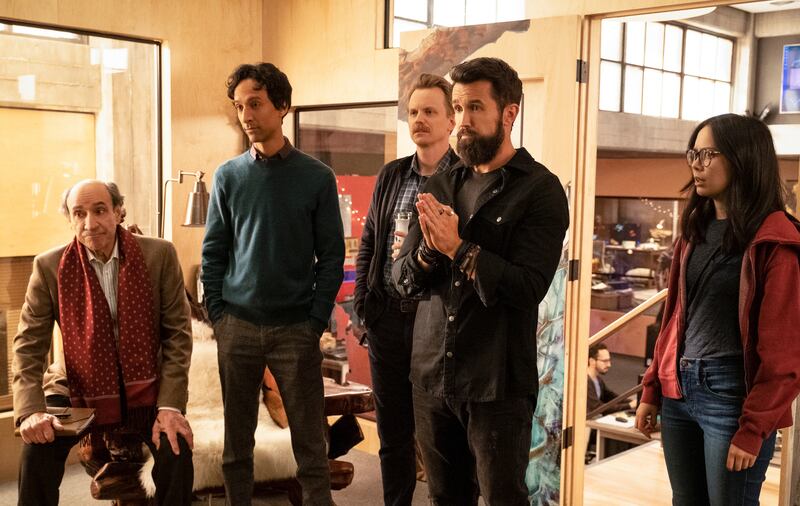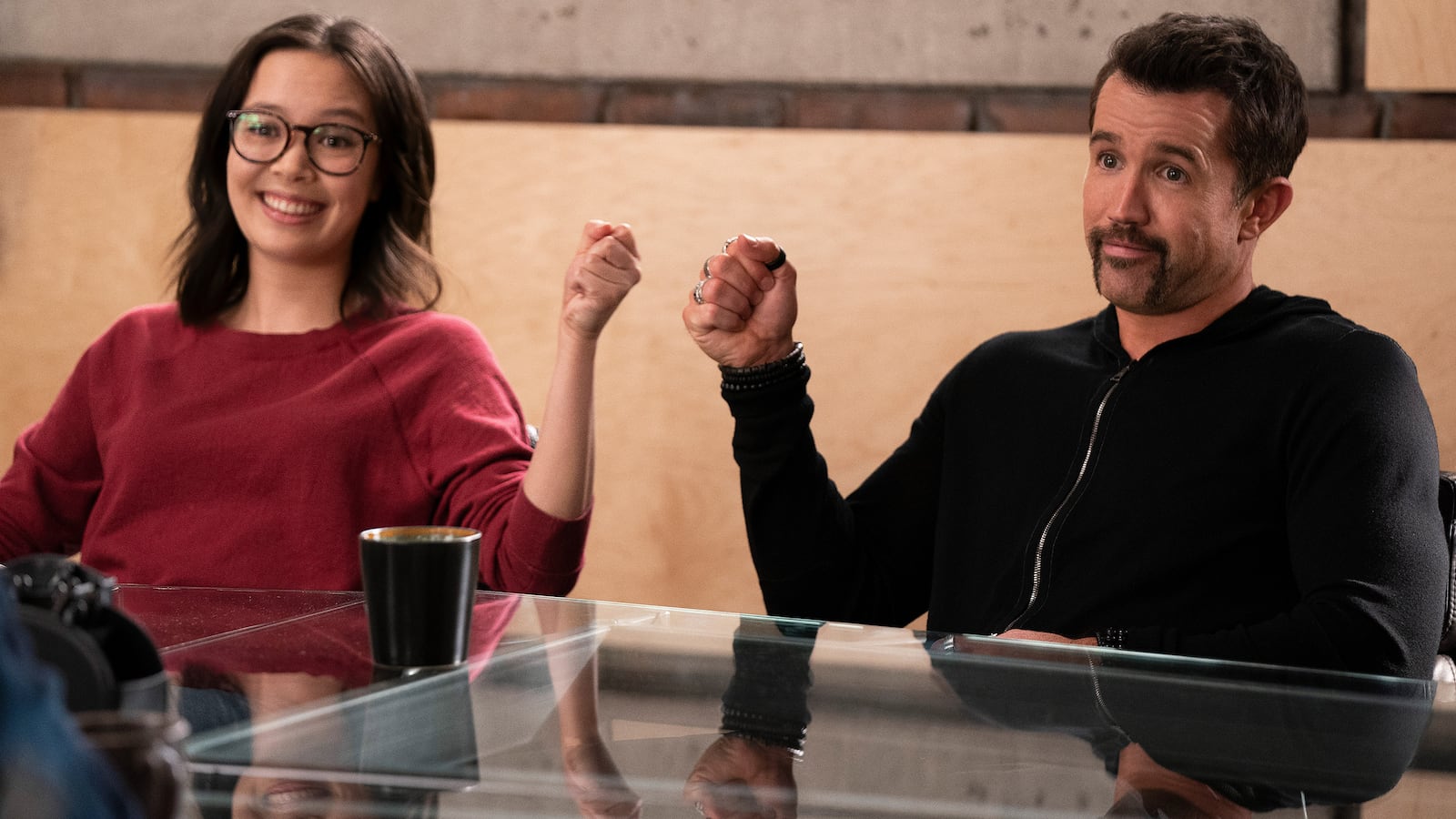The Apple TV+ comedy Mythic Quest loves a good backstory. So, it seems only fair that it gets one of its own.
About 22 minutes into the pilot episode, there’s a pivotal moment between the show’s two main characters: Poppy Li (Charlotte Nicdao) and Ian Grimm (Rob McElhenney). Poppy walks into Ian’s (pronounced Eye-an) office after a long day of arguing about a shovel Poppy wants added to the game’s new expansion. She proceeds to compare their relationship to that of a brilliant painter and his favorite brush. “I’m just, like, some tool that you use to create your masterpiece,” Poppy says.
It was while filming this scene that co-creator Megan Ganz realized just how special and unique Mythic Quest would be. “I knew it was going to be funny, but that scene in particular had so much heart and drama,” she tells The Daily Beast. “I think that was like a real wake-up call.”
Mythic Quest, which just aired its Season 2 finale on June 25, is not your typical workplace comedy. For starters, it’s set in the offices of a video game studio that produces the titular massive multiplayer online role-playing game (MMORPG). And the journey to arrive at that premise is as singular as the series.
When Ubisoft (the video game developer behind the Assassin’s Creed franchise and much more) first approached McElhenney (who co-created, executive produces and stars in the comedy) about making a show about game development, he was hesitant to take on the idea.
“That area has been mined in the past for comedy, but it was always pretty one-note and general and kind of marginalizing in a way,” explains McElhenney. “It just felt like something I wanted to stay away from.”

The cast of Mythic Quest
Apple TV+A trip to Ubisoft’s Montreal headquarters changed McElhenney’s mind. “I realized very quickly it was an office comedy that had something to do with game development, but that just happened to be what they did for a living,” he says. “It was really more about the personal dynamics of the people that worked in the office.”
McElhenney, of course, is one of the creators and stars of the successful and long-running comedy series It’s Always Sunny In Philadelphia. So, when assembling the Mythic Quest creative team, he didn’t have to look too far outside his Sunny family. He recruited Ganz, who worked as a writer and executive producer on Sunny, to run the show with him. Joining them was fellow Sunny co-creator Charlie Day (who’s billed as a co-creator of Mythic Quest).
“I had worked with them long enough to know that I really enjoyed the environment,” offers Ganz. “I read the first draft that they had of their pilot and really loved the characters, you’re always looking for conflict and a lot of ego that makes a show really funny, and there were all the ingredients there.”
Since McElhenney and Day’s other successful comedy found its roots on FX (and subsequently FXX), it may have come as a shock to some of their fans that Mythic Quest was one of the flagship shows for the new streaming platform Apple TV+.
“We had multiple offers from different places and we felt like Apple just seemed like a natural home for it,” McElhenney maintains. “It felt like it lined up with the ethos of what the show is, you know, it being a tech company and a gaming studio.”
On top of aligning itself with Apple and borrowing Ubisoft’s Montreal locale, Mythic Quest boasts a cast of characters that are extremely diverse in age, ethnicity, gender, and sexual orientation, which McElhenney says is representative of game-developer offices’ current make-up.
“What you really notice in these studios is that, yes, it’s certainly male-dominated, except the numbers skew so that the young people tend to be women and the older people tend to be men,” says McElhenney. “That was because there was a concerted effort made about 10 years ago by the gaming studios to start to bring in a lot more women. And as they did, they were bringing them essentially into entry-level positions.”
That’s why the four main women of Mythic Quest—Nicdao’s Poppy Li, Ashly Burch’s Rachel, Imani Hakim’s Dana, and Jessie Ennis’ Jo—are all younger women, most of whom are just starting out in their careers, while the men in the series—McElhenney’s Ian, David Hornsby’s David Brittlesbee, Danny Pudi’s Brad Bakshi, and F. Murray Abraham’s C.W. Longbottom—are all older and more established.
And it’s also why Nicdao is pitch-perfect as the aforementioned Poppy Li. Nicdao, who lives in Australia, would venture to Los Angeles once a year to audition for roles, but wasn’t having much luck landing a part. When she landed the audition for Mythic Quest, she was about to give up on her Hollywood dream.
“I remember reading the script and being like, ‘Wow, this is such an amazing script to go out on, what a fun scene to get to do for my last audition in L.A.,’” she says with a laugh over Zoom.
Two months later, Nicdao was on set shooting the Mythic Quest pilot and researching her role as a lead programmer by playing lots of The Legend of Zelda: Breath of the Wild on Nintendo Switch. Her character soon emerged as the beating heart of the series. Unlike most “boss ladies” in workplace comedies, Poppy is, as Nicdao puts it, “absolutely, undeniably, completely, messily human.” And she wouldn’t have it any other way.
“She’s a person that often doesn’t give a shit about anyone else’s feelings, which is pretty far away [from me],” Nicdao says with a laugh. “I’m constantly scanning the room for everyone’s facial expressions to check that everyone’s doing good.”
Nicdao isn’t the only actor on the show playing a character wildly different from themselves. Danny Pudi, who was recruited by Ganz after they’d worked together on Community, is Brad Bakshi, the ruthless, brutally blunt head of monetization for the company.
“It’s fun to be able to play someone who will just say exactly what he feels and he’s not wrong,” Pudi remarks. “It’s almost heroic how direct and honest he can be without caring how his words land on people.”
Ashly Burch, who also plays game tester Rachel, already had one foot in the gaming world, having voiced the characters of Aloy in the Horizon Zero Dawn franchise and Tiny Tina in the Borderlands series. She originally came on as a writer; when Ganz asked the writers’ room if they had any thoughts on casting, however, Burch threw her hat in the ring for Rachel. Little did she know that McElhenney had already been considering her for the role. She describes the process of landing the part as “surreal.”
“That’s just stuff that has been a part of my life, but that I never assumed would be in a sitcom, let alone sitcom with an Oscar winner,” offers Burch with a laugh. “There is something so legitimizing about Mythic Quest and the fact that it is on such a mainstream scale and that it gets to represent specifics about the industry.”
Burch’s Rachel is also one half of a will-they-or-won’t-they office romance with her game-testing partner Dana (played by Imani Hakim). Burch has heard from fans of the series that spotlighting this LGBTQ+ relationship is “such a breath of fresh air.”

Dana (Imani Hakim) and Rachel (Ashly Burch) of Mythic Quest
Apple TV+“So many LGBTQ relationships in television historically have been extremely fraught or the fact that they’re queer has been a major block in the road,” Burch explains. “The fact that this is just two people who like each other and it’s treated just as we’ve seen any other heterosexual couple in a sitcom without it being such a massive thing that they’re queer, I think people feel very seen.”
The bonds between all these characters even extend off-screen. It all started when Jessie Ennis invited Nicdao, Burch, and Hakim out to dinner after a costume fitting on set. “We had a few too many cocktails and we had the best night,” Nicdao recalls with a laugh. “We’ve just got this instant connection.”
The four even got together before Nicdao left for Australia to celebrate the release of the Horizon Forbidden West trailer. “The four of us all sat together and watched it,” Nicdao says. “We were cheering any time [Burch] speaks.”
Now, the four close pals—along with David Hornsby—decided to broadcast their amazing friendship for the enjoyment of fans, launching the “Questie Besties” podcast earlier this month.
Centering the experiences of women is just one way Mythic Quest doesn’t shy away from tough topics in gaming. Not too long ago, Gamergate terrorized the industry, with online trolls targeting female gaming journalists, female game developers and others in hateful attacks.
It’s a subject that Mythic Quest explored in a Season 1 episode that saw David Hornsby’s character escort a class of young female coders around the office—only for most of the women to not be there.
“I always believe that your message goes down a lot better if you kind of sell it with a joke,” says Ganz. “Maybe somebody isn’t quite so aware that they’re swallowing their medicine if you put a little spoonful of sugar on it.”
Dealing with tough or even taboo topics is nothing new for McElhenney, who approaches them head-on in Always Sunny. Recently, five earlier episodes of the comedy series were removed from streaming for their use of brown and blackface.
“What you only realize as you continue to grow and progress and learn things, is that you have blind spots,” McElhenney admits. “Even though your intentions were one thing, the execution was not appropriate and was hurtful and was not necessarily what we had intended.”
Such is the difficulty of satire, McElhenney says. And yet, that doesn’t mean he’s looking to stop addressing hot-button issues in both Sunny and Mythic Quest—or disregard past missteps.
“I think that there’s a danger in pretending things didn’t happen or just pulling things or getting rid of things,” McElhenney says. “Because then what that suggests is something even more sinister, which is that we didn’t have blind spots, that we’ve always hit the mark, because if that’s the case then where’s the room for growth?”
Nothing, however, could have prepared the Mythic Quest team for COVID-19. A week into filming Season 2, the set was shut down due to the coronavirus pandemic. Like most sets and workplaces, the stoppage was supposed to last two weeks, until it wasn’t. So they got creative, shooting a quarantine special episode of Mythic Quest from their respective homes.
“We started rewriting the season because the first episode of the second season was supposed to be the gang all going to E3. And, that obviously did not happen,” reveals Ganz. “Because we were trying to rewrite the second season and we had so little information about what that world was going to look like, we just realized the thing we can talk about is what we’re feeling right now.”
That special episode, airing May 22, 2020, did a brilliant job capturing office life during quarantine (Zoom galore!), and remains a favorite among the cast.

Poppy (Charlotte Nicdao) and Ian (Rob McElhenney) of Mythic Quest
Apple TV+“I think we’re all gonna look back at that time and remember a moment that we had—or sometimes moments that we had—that were like the moment that Poppy has at the end of that episode,” says Nicdao. “It was very real for me at the time as well. I was in L.A., thousands of miles away from my family. I don’t know if I’ll ever be more proud of anything in my career.”
The first post-quarantine shoot with everyone back on set also happened to be another special episode titled “Everlight.” Written by Burch, it was originally supposed to air midway through the second season and feature not only an office-wide LARPing tournament but also the first kiss between Rachel and Dana. When COVID-19 forced the Mythic Quest writers’ room to reimagine much of the season, it ultimately turned into, as Burch puts it, a “bridge between pandemic life into our more traditional sitcom.”
“Doing the rewrite and having it be about not only the readjustment to being around people again, but also this idea of, ‘Wow, we really need an injection of hope after everything that’s happened,’ I really resonated with it,” remembers Burch.
These special episodes within the universe of Mythic Quest are another thing that sets it apart from other sitcoms. Each season features a departure episode unlocking an important piece of the Mythic Quest puzzle. In Season 1, there was “A Dark Quiet Death” that looked at the rise and fall of an indie title that has a special connection to the titular game of the series. In Season 2, there was “Backstory!,” which delved into the early career of Abraham’s C.W. Longbottom, the game’s lead writer.
“We decided in the second season we wanted to do something like that again, because the audience responded so well [to “A Dark Quiet Death”],” says Ganz. “But, instead of giving them another full standalone, we thought, ‘Well, how can we use these sorts of departure episodes to greater increase our understanding of our characters and deepen their stories?’”
The story of Mythic Quest has merely just begun. While there is no news yet of a third season and the Season 2 finale leaves much up in the air for its beloved characters, one thing remains true: there are a lot more stories to be told in this world. With a good backstory, of course.


